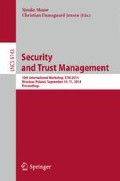Abstract
OpenID is a standard decentralized initiative aimed at allowing Internet users to use the same personal account to access different services. Since it does not rely on any central authority, it is hard for such users or other entities to validate the trust level of each other. Some research has been conducted to handle this issue, defining reputation framework to determine the trust level of a service based on past experiences. Deep analysis and validation need to be achieved in order to prove the feasibility of this framework. Our main contribution in this paper consists of a simulation environment able to validate the feasibility of that reputation framework and to analyze its behavior within different scenarios.
Access this chapter
Tax calculation will be finalised at checkout
Purchases are for personal use only
Preview
Unable to display preview. Download preview PDF.
References
Recordon, D., Reed, D.: OpenID 2.0: a platform for user-centric identity management. In: Proceedings of the Second ACM Workshop on Digital Identity Management, DIM 2006, pp. 11–16 (2006)
Dólera Tormo, G., Gómez Mármol, F., Martínez Pérez, G.: Towards the Integration of Reputation Management in OpenID. Computer Standards & Interfaces 36(3), 438–453 (2014)
Gómez Mármol, F., Martínez Pérez, G.: Security Threats Scenarios in Trust and Reputation Models for Distributed Systems. Elsevier Computers & Security 28(7), 545–556 (2009)
Borg, A., Boldt, M., Carlsson, B.: Simulating malicious users in a software reputation system. In: Park, J.J., Lopez, J., Yeo, S.-S., Shon, T., Taniar, D. (eds.) STA 2011. CCIS, vol. 186, pp. 147–156. Springer, Heidelberg (2011)
Douceur, J.R.: The sybil attack. In: Druschel, P., Kaashoek, M.F., Rowstron, A. (eds.) IPTPS 2002. LNCS, vol. 2429, pp. 251–260. Springer, Heidelberg (2002)
Dólera Tormo, G., Gómez Mármol, F., Martínez Pérez, G.: Dynamic and flexible selection of a reputation mechanism for heterogeneous environments. In: Future Generation Computer Systems (June 2014)
Author information
Authors and Affiliations
Editor information
Editors and Affiliations
Rights and permissions
Copyright information
© 2014 Springer International Publishing Switzerland
About this paper
Cite this paper
Dólera Tormo, G., Gómez Mármol, F., Martínez Pérez, G. (2014). ROMEO: ReputatiOn Model Enhancing OpenID Simulator. In: Mauw, S., Jensen, C.D. (eds) Security and Trust Management. STM 2014. Lecture Notes in Computer Science, vol 8743. Springer, Cham. https://doi.org/10.1007/978-3-319-11851-2_15
Download citation
DOI: https://doi.org/10.1007/978-3-319-11851-2_15
Publisher Name: Springer, Cham
Print ISBN: 978-3-319-11850-5
Online ISBN: 978-3-319-11851-2
eBook Packages: Computer ScienceComputer Science (R0)

